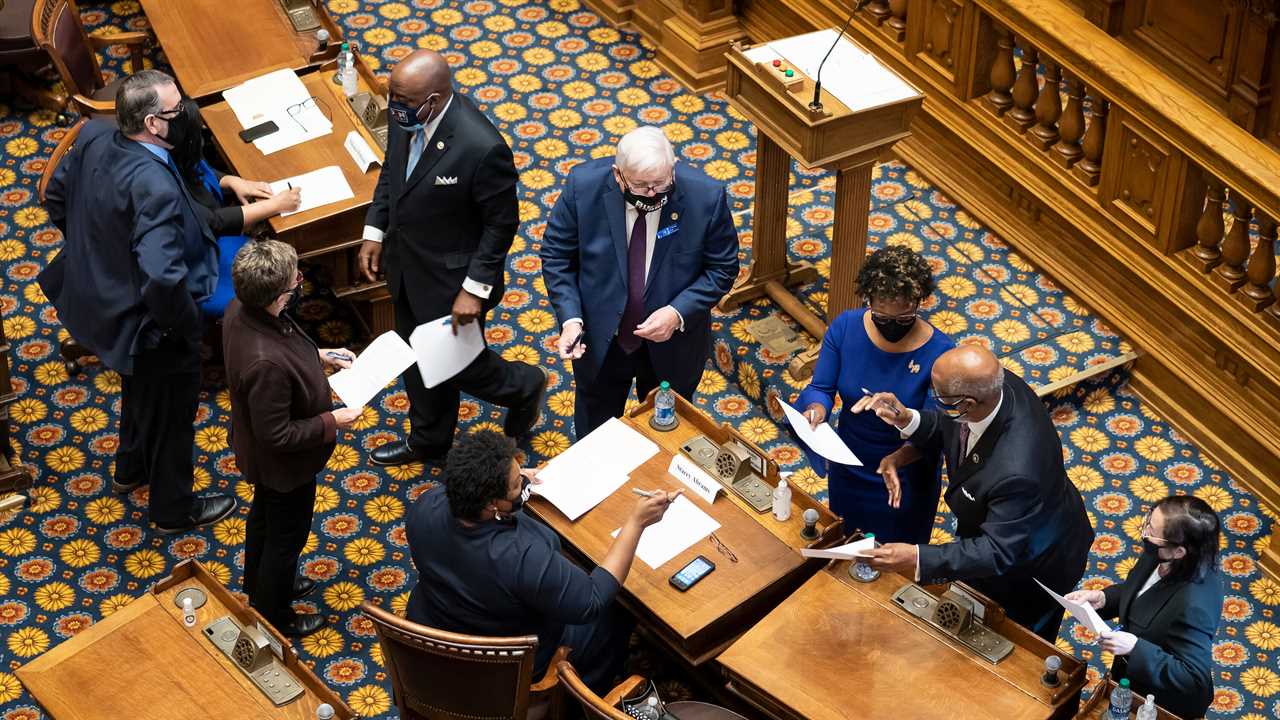
WASHINGTON — When future historians close the books on the misery of 2020, a grueling year of disease, death, racial strife, street violence, economic collapse and political discord the likes of which have not been seen in the United States in generations, they may look back on Monday, Dec. 14, as a pivotal juncture.
It was on that day that Americans began rolling up their sleeves for a vaccine produced in record time to defeat a virus even as the death toll crossed 300,000. And it was on that day that members of the Electoral College gathered in each of the 50 states to ratify the end of the most polarized election in more than a century.
None of that erases the enormous damage of the past 12 months, nor does it mean there will not be pain and protest to come. Many Americans will get sick and die in the months before the vaccine is universally available. Many Americans will remain aggrieved by the result of an election they wish had gone the other way. It is still an era of hardship and division. But after so much uncertainty, after so much doubt, the way forward appears clearer at least in two major respects.
“It is a cosmic convergence,” said Benjamin L. Ginsberg, a leading Republican election lawyer who has been critical of President Trump’s efforts to overturn the vote that he lost. “And what’s good about both of the events occurring on the same day is it really can provide a turning point for a nation that really wants a turning point.”
The day played out in a remarkable fashion as television viewers watched images of health care workers receiving lifesaving injections juxtaposed with live shots from state capitals around the country showing electors casting votes formally confirming the victory of President-elect Joseph R. Biden Jr. and Vice President-elect Kamala D. Harris.
It was the definitiveness of both developments that stood out after months of political, medical and economic turmoil: At last, Americans can look ahead to the day when they will be immunized from the Covid-19 virus even if takes until spring. And now they know despite all the postelection noise from the White House and its allies who will be president on Jan. 20.
“I honestly can’t recall two independent events of such extreme importance occurring on the same day,” said David Oshinsky, a professor of medicine at New York University’s Langone Health and a historian who wrote a Pulitzer Prize-winning account of the development of the polio vaccine that eliminated a scourge of the 20th century.
He said it was as if one were to combine the seminal election of 1800 between John Adams and Thomas Jefferson that set the precedent for presidential contests with the day that President Dwight D. Eisenhower thanked Dr. Jonas Salk for developing the polio vaccine. “In our bitterly divided country, Dec. 14, 2020, should remind us of who we are and what we are capable of,” Dr. Oshinsky said.
For Mr. Trump, the dean of denial who has refused to accept either the election results or the severity of the coronavirus pandemic, the clarity of Dec. 14 was not entirely welcome. He had reason to celebrate the debut of the vaccine, which he made a top priority and will surely count as a major part of his legacy even though he otherwise has played down the threat of the virus and undercut public health efforts to stem the outbreak through masks and social distancing. “First Vaccine administered,” he wrote on Twitter. “Congratulations USA! Congratulations WORLD!”
But he was not so ready to congratulate Mr. Biden, or accept the verdict of the Electoral College, even though it is vested by the Constitution with the power to determine the next president by majority vote. Mr. Trump remained out of sight all day, offered no concession and continued to pump out false claims of fraud supposedly so prevalent that it would justify overturning the will of the people.
Indeed, in what came across as an effort to distract attention from his loss in the Electoral College, Mr. Trump just minutes after California’s electors meeting in Sacramento put Mr. Biden over the top abruptly announced the departure of Attorney General William P. Barr, who had angered the president by refuting his fantastical assertions about widespread election corruption.
With that process complete, Mr. Trump’s refusal to accept defeat became little more than railing against the weather. There may be more futile lawsuits filed to go with the dozens that have already been dismissed all the way up to the Supreme Court, and some of his allies may object when Electoral College votes are officially counted by Congress on Jan. 6, but none of that will change the outcome.
Never in American history has a majority vote by the Electoral College been reversed. Like it or not, Mr. Biden will be sworn in 37 days from now.
“This day feels like a turning point because in both cases we have reality breaking through — a legally mandated deadline to end the election cycle being met in an orderly way and a carefully reviewed and tested vaccine being brought into general use,” said Yuval Levin, the director of social, cultural and constitutional studies at the conservative American Enterprise Institute.






